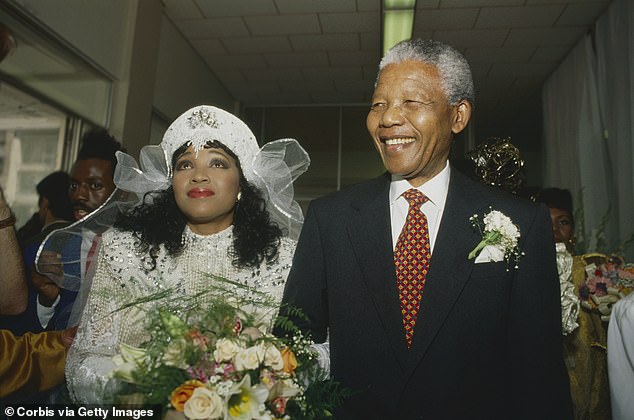Uncategorized
Nelson Mandela’s daughter, Zindi had coronavirus
Published
4 years agoon
By
Frimpong
Zindzi Mandela, the daughter of South African anti-apartheid leaders Nelson and Winnie Mandela, tested positive for coronavirus the day she died.
Her son Zondwa Mandela today revealed his mother did have the disease – but it may not be what caused her death aged 59 in Johannesburg on Monday.
Zindzi is the world’s highest profile victim of coronavirus, which has killed more than 4,400 people in South Africa alone.
Her son Zondwa Mandela told state broadcaster SABC: ‘My mother did in fact test positive for Covid-19 on the day of her passing.
‘Although, this doesn’t therefore mean that she died of Covid-related complications, but simply that she tested positive for it.
He added: ‘Simply by the virtue that there was a positive test, we are therefore obligated to function and work within the framework of the existing regulation related to such cases.’
Zindzi Mandela, the daughter of South African anti-apartheid leaders Nelson and Winnie Mandela, died on Monday morning in hospital.
Zindzi rose to international prominence when she read out Nelson Mandela’s rejection of then-president P.W. Botha’s offer for freedom in 1985.
The white minority government offered to release Nelson Mandela from prison if he denounced violence perpetrated by his movement, the Africa National Congress, against apartheid.
She read his letter rejecting the offer at a packed public meeting which was broadcast around the world.
The 59-year-old was serving as South Africa’s ambassador to Denmark.
‘This is untimely. She still had a role to play in the transformation of our own society and a bigger role to play even in the African National Congress,’ said ANC spokesman Pule Mabe.
The Mandela Foundation posted earlier that on this day in 1969, Nelson’s eldest son, Madiba Thembekile – Zindzi’s half brother – died in a three-car collision, which left another four people dead.
Zindzi’s other half-brother, attorney Makgatho Mandela, died of AIDS in 2005.
His death led to an impassioned statement from then President Mandela, who called on the public to ‘give publicity to AIDS’ and to ‘not hide it’.
Another of her siblings died in 1948 at just 18-months old.
Last year Zindzi stirred controversy by calling for the return of the white-owned land to South Africa’s dispossessed Black majority.
‘Dear Apartheid Apologists, your time is over. You will not rule again. We do not fear you. Finally the land is ours,’ she tweeted in June last year.
President Cyril Ramaphosa led the tributes to Zindzion Monday.
‘Zindzi Mandela was a household name nationally and internationally, who during our years of struggle, brought home the inhumanity of the apartheid system and the unshakeable resolve of our fight for freedom,’ he said.
‘After our liberation, she became an icon of the task we began of transforming our society and stepping into spaces and opportunities that had been denied to generations of South Africans.
‘Her spirit joins Tata Madiba and Mama Winnie in a reunion of leaders to whom we owe our freedom.’
South Africa’s foreign affairs minister Naledi Pandor has expressed shock at Mandela’s death, describing her as a heroine.
‘Zindzi Mandela was a household name nationally and internationally, who during our years of struggle, brought home the inhumanity of the apartheid system and the unshakeable resolve of our fight for freedom,’ he said.
‘After our liberation, she became an icon of the task we began of transforming our society and stepping into spaces and opportunities that had been denied to generations of South Africans.
‘Her spirit joins Tata Madiba and Mama Winnie in a reunion of leaders to whom we owe our freedom.’
South Africa’s foreign affairs minister Naledi Pandor has expressed shock at Mandela’s death, describing her as a heroine.
‘Zindzi will not only be remembered as a daughter of our struggle heroes, Tata Nelson and Mama Winnie Mandela, but as a struggle heroine in her own right. She served South Africa well,’ said Pandor.
Zindzi was born in the midst of the anti-apartheid struggle, the same year that her father’s African National Congress created its armed wing. Zindzi, her mother, and her sister Zenani, faced harassment by the ruling National Part while her father was imprisoned on Robben Island, the BBC reported.
In a 1995 interview with Thandy magazine, Zindzi said: ‘I am something of a rebel.’
‘I never knew a normal life,’ she added.
You may like
-


Sudan and Cote d’Ivoire take commanding first leg wins in final qualifiers
-


WAEC Warns of Continued Delays in WASSCE Results as Financial Crisis Deepens
-


Dozens of children killed in crush at Nigerian Christmas funfair
-


President-elect Mahama Calls for Urgent Overhaul of Ghana’s Energy Sector Amid Economic Concerns
-


Ghana Secures $316 Million in FDI for First Three Quarters of 2024
-


CAF President Dr Motsepe begins two-day tour of CHAN 2025 Host Nations in Tanzania on Thursday
-


Electoral Commission Calls for Unity Amid Controversies Over Parliamentary Results
-


Parents Held Accountable as Teen Driver Sentenced in Fatal East Legon Accident
-


Suspect Arrested for Vandalism at Parliament
















